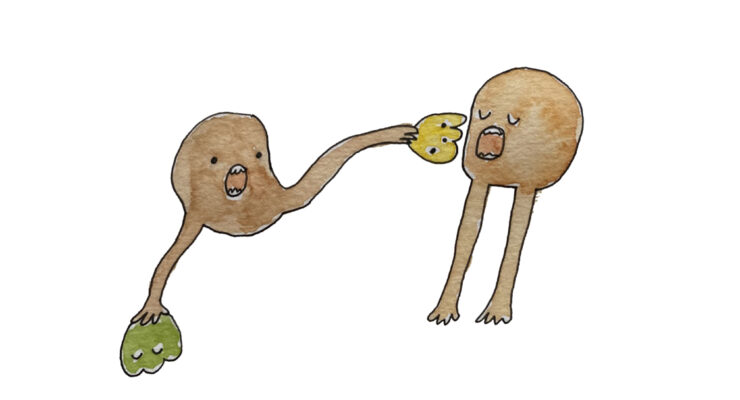Part 1: Clean Meat and Food Design
Protein Fantasy is a speculative food design project that was created based on Cellular Agriculture and the technology of “clean meat”. The way we prepare food and eat it has affected the path of human evolution. This project takes a step forward in discussing the possible food futures and our relationship with new food technology and design.
About 230 million years ago, human ancestors discovered ways to cook food with fire, making it easier for meat to be chewed and digested. Furthermore, viruses and bacteria were reduced, allowing energy to be utilized more efficiently. Thus humans had more time to hunt, invent more advanced tools, and establish new social relationships. It is also important to consider that with the passing of time human teeth have changed because of a decrease in the need for chewing. This along with a gradual change in the internal organs and bones have led to the evolution of humans into Homo erectus.
Food forms and cooking methods have had a significant influence on the evolution of humanity and the development of civilizations. With the rapid growth of industry, biology, and information technology, will there be a revolutionary change in food? Will there be a profound influence on human evolution? Food designer, Yunwen (Tutu) Tu poses a series of ideas about the form of food in the future and proposes the possibility of a food revolution. If achieved, this will have an enormous impact on human behavior and life.

Tutu’s interpretation of food design
"Food forms and cooking methods have had a significant influence on the evolution of humanity and the development of civilizations."
Although the efficiency of the traditional livestock husbandry industry continues to increase, it still consumes a lot of resources and time that causes damage to the environment. Livestock has led to about 14% to 18% of greenhouse gases, exceeding the emissions by transportation and exacerbating the global warming process. The traditional livestock industry is outdated relative to the development of other industries including information technology. The continuous advancement of modern technology exceeds our imagination, and the livestock industry can benefit from it.
In recent decades there has been an increase in concerns about the ethics of industrialized livestock breeding and slaughter. More and more people have adopted vegetarianism to avoid the negative impact of meat consumption. Although there has been a gradual shift towards vegetarianism, which may even be regarded as a new fashion, a meat-based diet is still the norm for most Americans.
Ultimately, our current system is unsustainable. The global population is expected to grow to 9.6 billion and the demand for food production by humans will increase by 70% by 2050.
Traditional animal farming and industrial livestock will be unable to meet new demands and challenges. So, does that mean no more meat for us from now on? Does this challenge bring the possibility of another kind of food? Human imagination and creativity are limitless.

Clean Meat
In areas dominated by scientific and technological innovations, such as Silicon Valley, groups of bioengineers and scientists have proposed that in a specific laboratory environment new “clean meats” can be cultivated, without killing any animals, only by cell replication. This represents a clean breeding environment and a cruelty-free animal meat manufacturing process. The research and development of this technology will ease the food problems we currently face. Many business leaders, led by Microsoft’s Bill Gates and Virgin Atlantic founder Richard Branson, have invested billions in this technology.

Will we have this in the future supermarket?
Based on these latest food development concepts, research on current food issues and clean meat technology, as well as inspired by speculative future design, Tutu envisions a set of future protein food production and consumption methods – Protein Fantasy. She hopes to find a balance between new technology and natural production methods by using Human-Food Interaction thinking to find a more exciting dining experience.
Design Context
In the U.S. there is a highly industrialized food production model and food culture. These are the products of a market economy which hide unhealthy, opaque, insecure, environmentally unfriendly, and even unethical issues.
Through these problems, Food designer Tutu proposes Protein Fantasy, a future living scenario when clean meat has already adapted to our daily life and diet. She also envisions a system in a society of autonomous agriculture where people will have efficient smart food systems in their homes.

Read more in the second chapter, Designing the Future of Clean Meat.
—
Text by Tutu

Read more about Tutu on her:
Website: tutufooddesign.com
Instagram: @tutu.fooddesign
LinkedIn: Yunwen Tu (Tutu)











